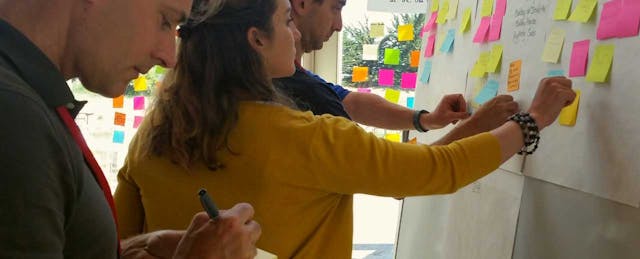“Entrepreneurship education today is about how to run a lemonade stand,” explains Steve Blank, a serial entrepreneur and one of the founders of the Lean Startup movement. But he hopes that when life gives them lemons, students today can make something a little more innovative than lemonade.
While observing his daughter’s 7th grade entrepreneurship class at a private school in Silicon Valley, Blank was shocked by the curriculum, which covered concepts like cash flow and skills like how to complete an income balance sheet. “Current entrepreneurship classes prepare you to run a 20th century small business, which is not the same as running a startup,” Blank says. “It was a wasted opportunity to teach them real entrepreneurship, and give them those critical thinking skills.”
It was an opportunity that no entrepreneur—especially Blank—could pass up. So he decided to bring his Lean Startup model to innovators disrupting the schoolyard. At Lean LaunchPad educator workshops, he prepares higher education professors to bring the curriculum back to their students.
Lean LaunchPad at Hawken School
Doris Korda, associate head of school at the Hawken School, an independent K-12 school in Cleveland, sat in on Blank’s 2013 Lean LaunchPad Educators’ class (designed for higher education professors), and brought the Lean Startup model back to her students. “I realized that [the Lean Launchpad curriculum] is the scientific method for today,” says Korda, who worked as an engineer for AT&T Bell Labs before she started teaching. In her Entrepreneurial Studies class, Korda’s students “help real businesses with a social purpose solve real problems,” learning customer development skills and business strategy along the way.
For one project during the spring 2015 semester, her students helped a local Cleveland business, Rust Belt Reclamation, figure out how to market custom products to individual consumers, rather than to businesses. “The CEO had tabled the idea of the customer-facing business,” explains Korda. But after students conducted market research and presented four different business expansion plans, he was on-board. “He’s using all kinds of elements from the student plans now, and two of the students are summer interns there,” says Korda.

After success with students at Hawken, Korda worked with Blank to create the Hawken Lean LaunchPad for K-12 Educators workshops, designed to help teachers bring this methodology to early entrepreneurship courses across the country. Over 90 educators have participated in the three 2 ½ day workshops that have been held so far. Korda hopes to bring the model to many others by developing a toolkit of resources for K-12 educators looking to bring the Lean LaunchPad curriculum to their students and by lowering the cost of the workshops, which can be sizable; the most recent workshop cost $1100 per person. Blank has even loftier aspirations, envisioning the Lean LaunchPad curriculum as becoming “the national standard [in schools] in five years.”
Lean LaunchPad Comes to K-12 Nationwide
Terry Chou participated in the Hawken Lean LaunchPad workshop in spring 2014. The 7th and 8th grade science teacher at Joaquin Miller Middle School in San Jose, CA wanted to design a science fair prep elective to engage her students around individual projects. But with 35 students per class at the public middle school, she had to find a way to “teach innovation en masse,” she explains. Looking for a way to “merge science and business” in her curriculum, she found the Lean LaunchPad model, in which “you have to validate each hypothesis through customer development and discovery.” Chou calls it “the scientific method for a business company” that she was looking for.
At the workshop, Chou learned about tools for teaching business, like Blank’s Udacity videos, and how to use the Canvas business model. She also gained a network to turn to while implementing her science research elective, including support and mentorship from Korda.
This year, Chou brought the entrepreneurship curriculum to her 7th and 8th grade students—and was amazed at what they created. Chou’s design of the semester-long course may be familiar to startup entrepreneurs. Students came up with ideas, pitched them to the class, and voted for the top nine. Each student behind a chosen idea became CEO of his or her company, and “hired” the rest of their team from fellow classmates. Over the rest of the semester, students developed business skills while learning the science behind their projects, which ranged from a suitcase that would follow the traveler around (in the final product, the traveler could use a TV remote control to activate an Arduino sensor inside the suitcase) to a Tinkercad model of a desalination plant.
Some of the projects were less feasible than others. (Unfortunately for California, the students didn’t end up solving drought through desalination.) But Chou sees that as part of the learning experience. “This isn’t a million-dollar idea right now, this is a playground,” she explains. “They discovered for themselves that it wasn’t scalable for them to solve the drought.”
Her students also learned a skill equally applicable in the 7th grade and the Silicon Valley garage. “I tell them, don’t just hire your friends,” she says. “With only friend groups, we see the same emotional implosions as would happen at any startup—but in the safety of the classroom context.”
Why Teach Entrepreneurship in K-12?
Blank sees these startup skills as important for all young students to learn, regardless of whether they enter the business world. He likens it to teaching art appreciation to all students, whether they end up painters or astronauts. “Part of our culture says, you ought to appreciate painting, it’s part of what human beings are,” he explains. “We need to teach life skills for entrepreneurship or innovation, whether a student ends up starting a business or just having an appreciation.”
Korda agrees. “I could care less if a student has any intention of going into business,” she says. “For this generation and those to come, teaching entrepreneurship teaches students how to approach problems that don’t have answers in the back of the book.”


